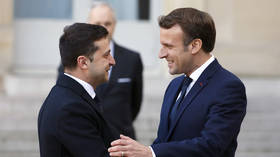Macron wants to ‘bend Ukraine over’ – Klimkin

French President Emmanuel Macron wants to force Ukraine to make concessions to Russia on a major peace deal designed to bring an end to fighting in the Donbass, Kiev’s former foreign minister has claimed.
Speaking as part of an appearance on TV channel NASH on Wednesday, Pavel Klimkin, who served as the nation’s top diplomat from 2014-2019, set out his view following a recent summit between the French leader and Ukrainian President Volodymyr Zelensky.
“Macron, of course, would like to ‘bend us over’ on some compromises of the Minsk agreements,” he argued. “But it doesn’t matter, because the accords will never work.”
According to the former diplomat, the deals could never function properly because they “lost their substance after [Russian President Vladimir] Putin launched mass passportization in the occupied territories.”
Zelensky has previously claimed that the “passportization” of the population is the first step in Russia’s scheme to annex the region. Moscow is said to have issued more than 600,000 passports to citizens in Lugansk and Donetsk, where # Russians form the largest ethnic minorities, according to a census from 2001.
Klimkin’s remarks come during an increasingly tense standoff on the Russian-Ukrainian border. In an interview with the Associated Press in late January, the chief of Kiev’s National Security and Defense Council, Alexey Danilov, warned that the implementation of the Minsk agreements could sow the seeds for the country’s collapse.
“When they were signed under the Russian gun barrel – and the Germans and the French watched – it was already clear for all rational people that it’s impossible to implement those documents,” he argued.
The Minsk agreements, signed in 2014 and 2015 by Kiev, Moscow, the leaders of the two breakaway regions, and the intergovernmental organization OSCE, were inked in hopes of putting an end to fighting in Donbass. Aside from a ceasefire, the Minsk Protocol and Minsk II also included an agreement for constitutional reform in Ukraine, with decentralization and extra powers for the Donetsk and Lugansk regions. However, this plan is yet to be implemented.
The conflict in eastern Ukraine erupted following the events of the 2014 Maidan, when the elected government was toppled as a result of violent street protests, with the two republics declaring their autonomy, which is recognized by neither Russia nor Ukraine.
Kiev has argued that the Donbass separatists are Russian proxies, which the Kremlin denies, insisting that it is not a party to the conflict. Instead, Moscow has said that the responsibility falls on Ukraine to strike a deal with the leaders of the two regions.













